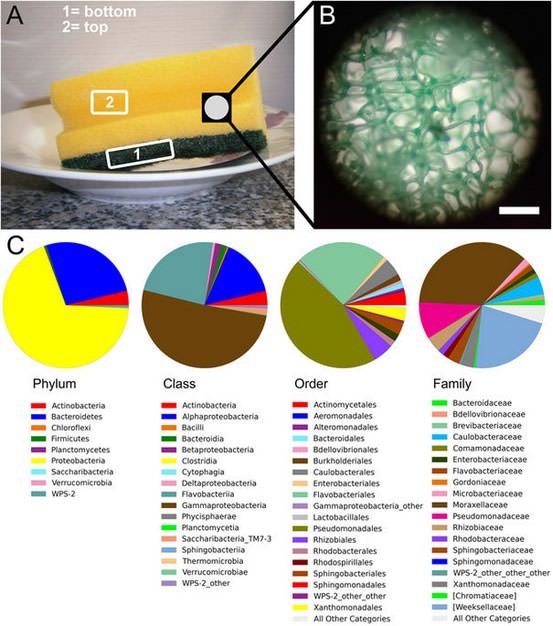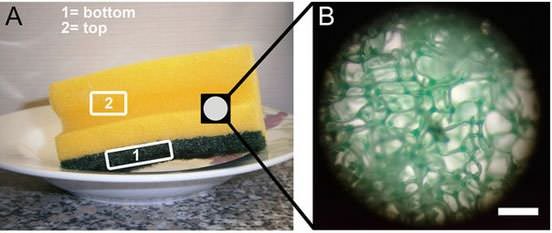Sanitation has been a big factor for the improvement of the overall health and well-being of humans. We spend 90% of our lifetimes within built environments wherein various microorganisms colonize and develop microbiomes. From huts in rural villages, to more confined areas, to extreme habitats -- microorganisms follow us everywhere.
Some of our habits, and the areas that are host to our behavior like kitchens and bathrooms, have a high potential to act as microbial incubators. Contrary to popular misconceptions, our kitchens have been demonstrated to have more microbes that our toilets (200,000x more). Kitchen sponges have the highest level of bacteria in the whole living environment, apart from the drain traps. Sponges are not only reservoirs for microorganisms, but they also act as disseminators of bacteria as they are used to wipe surfaces.
Kitchen sponges are very popular in our modern age. They conveniently hold more water and soap than a regular dishcloth, giving you more solvent power when you're scrubbing away at dirty dishes. Not only that, popular models of kitchen sponges have one side covered with a scrubbing pad made of metal or plastic.
The issue of high levels of microbes and bacteria in kitchen sponges has been known for a while. Some of the bacteria found in your kitchen sponge could be a close relative to pneumonia and meningitis, according to a new study recently published in Scientific Reports.
Researchers sequenced the microbial DNA of 14 kitchen sponges. They also tried to see if the sponges could be properly sanitized using microwave and boiling treatments to reduce the bacterial load. The effectiveness of reducing the bacteria using these methods works in the laboratory, but not so much in used kitchen sponges but still able to reduce the general amount of bacteria to more than 60%.

Pie charts showing the taxonomic composition of the bacterial kitchen sponge microbiome
Additionally, despite some of the bacteria going down, there are some pathogen-related bacteria that are more resistant to cleaning and will re-colonize areas that have been left empty. This is similar to what happens in our guts after an antibiotic treatment. Killing some bacteria opens up free space for others to move into, whether they are better bacteria or worse. Cleaning sponges doesn't really work, it can even make it more harmful as the worst bacteria proliferate.
Kitchen sponges have so much bacteria, that this study found more than 5 x 10^10 bacteria in a single cubic centimeter (cm³). Just to give an idea of how much bacteria outnumber humans, in that single cm³ there are 7 time more bacteria than humans on the planet. And the scientists also say that such high number per volume are only found in one other place they know of: feces. That's right, poop and sponges have the same quantity of bacteria per volume.
No need to freak out (yet). The solution is to replace your kitchen sponges every week. That way you limit the build up of bacteria and keep your exposure lower.
Personally, I don't like sponges, they are too soft. I don't like grabbing it and having soap foam out. I also like the grab and grit of cloths more. Although the scratch/scrub surface of sponges is handy when you have some touch backed/burned cleaning to do, I just have a scrub pad without a sponge.
Do you like to use a kitchen sponge to clean the dishes?
Do you prefer a sponge to a cloth?
Have you been keeping your sponges too long?
Will you switch over to a cloth instead of a sponge after reading this 'scary' post (hehe)?
Thank you for your time and attention. Peace.
References:
https://www.nature.com/articles/s41598-017-06055-9
https://www.ncbi.nlm.nih.gov/pubmed/12392526?dopt=Abstract
https://www.ncbi.nlm.nih.gov/pubmed/22984730?dopt=Abstract
https://www.ncbi.nlm.nih.gov/pubmed/22752336?dopt=Abstract
http://www.dailymail.co.uk/health/article-2235650/The-kitchen-sponge-200-000-times-dirtier-toilet-seat--lead-PARALYSIS.html
If you appreciate and value the content, please consider:
Upvoting  , Sharing
, Sharing  or Reblogging
or Reblogging  below.
below.



